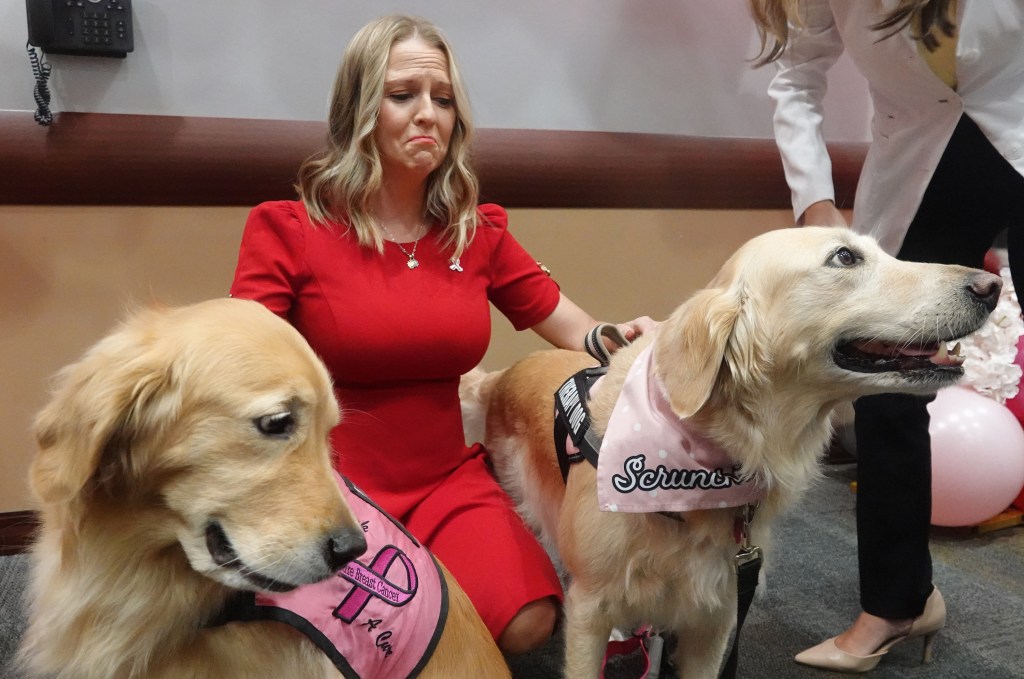Priscilla Timmons of Cooper City had been in a coma at Memorial Hospital West for more than 24 hours when something wonderfully odd occurred.
She felt Scrunchie, a Golden Retriever, nuzzle her finger, and reached out to the therapy dog who had been brought to her bedside in the intensive care unit at Memorial West Hospital in Pembroke Pines.
Until then, Timmons, only 38 at the time, said she could hear her family beside her in the ICU praying and encouraging the medical staff to pray. She knew she was fighting for her life, but had been unable to open her eyes or communicate. Her cousin, knowing Timmons is a dog lover, asked for the therapy pet to visit.
“I remember, while unable to open my eyes, having a very special visitor, one of the Memorial’s special therapy dogs,” Timmons said on Wednesday when she returned to Memorial West to reunite with her medical team and 7-year-old Scrunchie. “I remember everyone telling me she was there. I then felt her paw and that’s when I was able to move my fingers and lift my hand off of the bed.”
By almost every measure, Timmons had less than a 10% chance of survival. She now acknowledges it’s a miracle she is alive and that her days in a coma are behind her.
In March, after collapsing in the bathroom of her Cooper City home, Timmons suffered a massive pulmonary embolism that triggered three cardiac arrests and required 41 minutes of resuscitation before Memorial’s medical team restored her pulse.
“Most of the time, ICUs or resuscitation teams don’t persist after several rounds of resuscitation, but we persevered,” said Dr. Daniel Mayer, chief of critical care for the Memorial Healthcare System. “One or two people said to me, ‘Are you sure you don’t want to stop?’ But something made us continue.”
However, Timmons’ trauma didn’t end there. Her body began shutting down and she endured multi-organ failure, dialysis, liver and respiratory failure.
Mayer said it took staff from throughout the hospital working together to keep Timmons alive.
“It was all hands on deck … all of our divisions, all of our departments are so intertwined between the ER, the ICU, the IR [interventional radiology] teams, nurses, doctors, we’re very interconnected and so we had this continuous heavy flow of care, which really made a world of difference,” he recounted.
At Memorial West Hospital on Wednesday, Timmons and her family thanked the medical team who saved her life and helped her heal — Scrunchie included. “Yes, I’m a miracle, but it’s because of you. You are all true heroes,” she said.
Nearly a month after she arrived in an ambulance, Timmons recovered enough to be discharged. After regaining her strength and mobility, she has returned to her everyday life.
“In my eyes, faith and medicine go hand in hand,” Timmons told the dozens of hospital staff gathered to celebrate her. “There’s the science aspect, which consists of studies and medicine … Then there’s the faith aspect, which gives you hope to lean on and helps keep you going. You all gave me medicine to help me, and God gave you faith not to give up. So I would just like to say thank you for not giving up on me.”
Mayer, who has spent many years working in critical care, said it is unusual for someone as young as Timmons to experience a pulmonary embolism, which is a blood clot in the lungs. “In Priscilla’s case, it was what we call idiopathic. There was no cause for it. It was one of those just very unfortunate situations.”
Timmons’ cousin, Kandi Barnwell, said Wednesday she is grateful for the therapy dog program at Memorial Healthcare System, and talked about watching Priscilla respond.
“Scrunchie came in, walked to her bedside, and in that moment, for the first time, I got to see Priscilla move her hands and reach out to pet Scrunchie,” Barnwell said. “It was such a beautiful thing to witness. There wasn’t a dry eye in the room.”
Along with Scrunchie, Honeycrisp, a 5-year-old Golden Retriever, also visited Timmons during her recovery at the hospital.
“Thank you for allowing these incredible animals to do what they do best, bring light into the darkest moments,” Barnwell said.
Mayer said Timmons’ experience boosts morale.
“You know, being an ICU doctor, we deal with a lot of suffering … So patients like Priscilla make us want to come back to work, make us want to try harder,” he said. “It’s just a just a tremendous feeling seeing Priscilla all right.”
South Florida Sun Sentinel health reporter Cindy Goodman can be reached at cgoodman@sunsentinel.com.
Originally Published:


